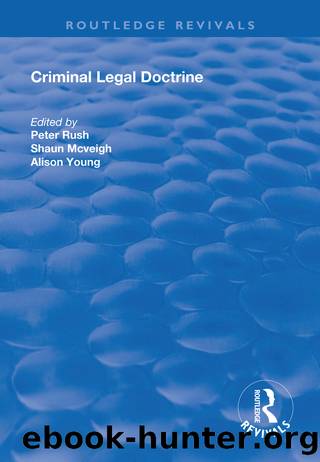Criminal Legal Doctrine by Peter Rush Shaun Mc Veigh Alison Young

Author:Peter Rush, Shaun Mc Veigh, Alison Young [Peter Rush, Shaun Mc Veigh, Alison Young]
Language: eng
Format: epub
ISBN: 9781138331426
Goodreads: 40986081
Publisher: Routledge
Published: 1997-11-01T00:00:00+00:00
Trials by Battle
The battle (battel) or judicial combat, as a form of trial15 in which the question at issue was to be decided according to the result of personal combat between the contesting parties or between their champions, is not considered to be essentially an appeal to physical force. Rather it is accompanied by a belief that providence will give victory to the right. The personal combat refers to an organised attempt to call upon a divine authority to decide the justice of a claim or an action or the truth of an accusation. However, as with all other trials by ordeal, such legal proceedings were also formal tests employed under fixed conditions to determine, and thus prove, the will of God. Christianity transfers this appeal from heathen deities to the God of battles, where a legal position could be affirmed by an appeal to divine judgment. Thus a dispute over the title to the ownership of real estate, for example, or any other legal difference, could be settled by duel under the shadow of the church. The combat, whether between two or many, was in its uncertain issue connected with unseen powers, and in the years of its unfolding history became regarded as the greatest test of truth, the judicium dei par excellence (Brace, 1886, 163).16 The use of the various forms of trial by battle tested the truth by empowering the victor even at the risk of sacrificing his own blood, although it should be remembered that the battle made no allowance for difference in strength. It was considered that God could and, where appropriate, would empower the weaker of the two parties; such was the parabolic message of the fight between David and Goliath (Aquinas, 1990, 2, ii, Q. 95, art. 8). As the author of Beowulf points out, 'God alone knows who will control the place of battle, who will win' (Beowulf, 1980, 94-5). It is interesting to note at this point that a particular etymology of the word 'evidence' is connected to the word 'evince': to conquer, to overcome, to cast down, to eject judicially or to make a victor or a victim (vincere) (Oxford Dictionary of English Etymology, 1966; T. Thomas, 1587).
The formal and legal organisation of these combats took the form of the medieval equivalent of advocacy. Lawyers were given the task of counting or telling the tale, putting the plaintiff's case in formal terms according to custom. Such performances, which might be considered to precurse both pleading and advocacy, were understood to be the central activity in combative litigation. Thus the earliest professional lawyers were known as narratores in token of the description of the plaintiff's case, or counts (contestnarratios). The plaintiff's case would be formulated and then met by a word-for-word denial by the defendant. Only then would the dispute be settled by incorporating both claim and denial in an oath to be submitted to the judicium dei and the battle, the judgment of God supporting the truth of one or other of the statements.
Download
This site does not store any files on its server. We only index and link to content provided by other sites. Please contact the content providers to delete copyright contents if any and email us, we'll remove relevant links or contents immediately.
The New Jim Crow: Mass Incarceration in the Age of Colorblindness by Alexander Michelle(848)
The Complete Idiot's Guide to Forensics by Alan Axelrod(837)
A New Kind of Monster: The Secret Life and Shocking True Crimes of an Officer . . . And a Murderer by Timothy Appleby(831)
HELTER SKELTER by Vincent Bugliosi(808)
Love Behind Bars by Jodie Sinclair(796)
Ratman: The Trial and Conviction of Whitey Bulger by Howie Carr(692)
A Life and Death Decision by Scott E. Sundby(691)
Executing Freedom by Daniel Lachance(681)
A Wilderness of Error: The Trials of Jeffrey MacDonald by Errol Morris(659)
Stop and Frisk by Michael D. White & Henry F. Fradella(647)
The Killer of Little Shepherds: A True Crime Story and the Birth of Forensic Science by Douglas Starr(639)
The Central Park Five by Sarah Burns(638)
Scotland Yard Casebook by Lock Joan(635)
Homicide Special: A Year With the LAPD's Elite Detective Unit by Miles Corwin(631)
Kidnapped by a Client by Sharon R. Muse(616)
How to Beat The Police Interrogation - Learn Their Dirty Tricks & Tools by Learn Their Dirty Tricks & Tools(610)
Issues and Controversies in Policing Today by Johnny Nhan(608)
Until Proven Innocent by Stuart Taylor Jr(602)
Why Some Women Lie About Rape by Linda Fairstein(537)
